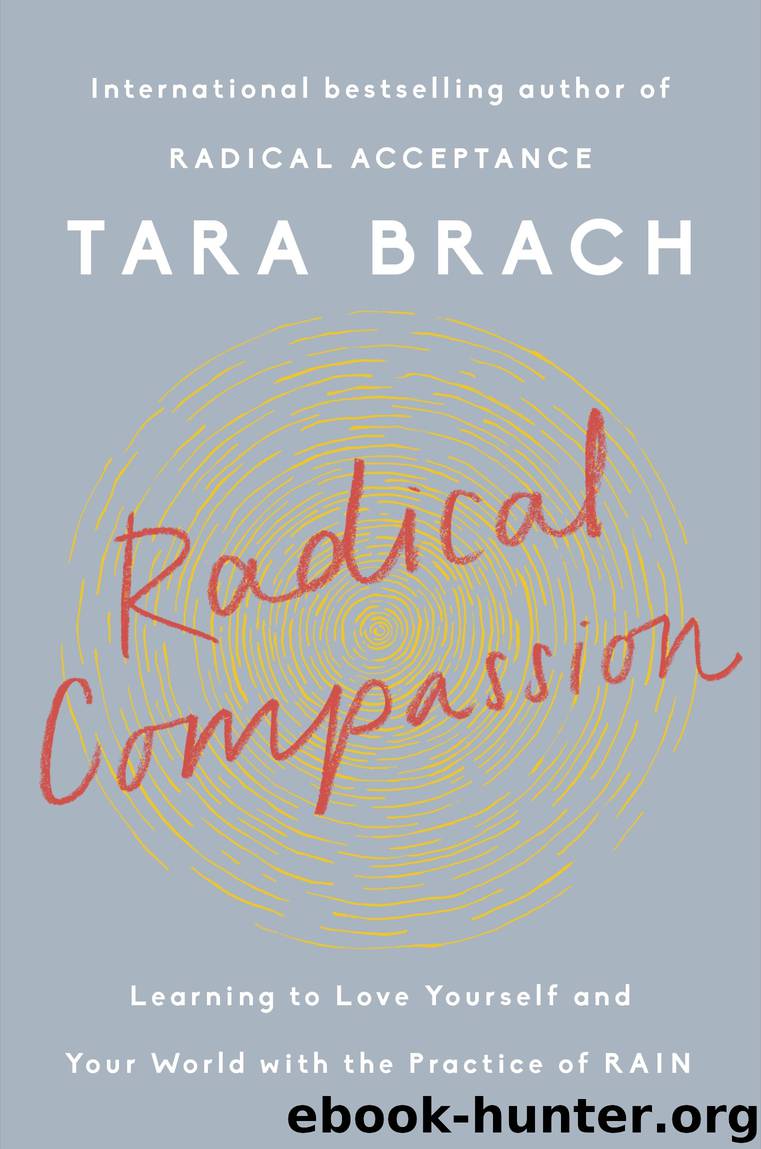Radical Compassion by Tara Brach

Author:Tara Brach
Language: eng
Format: epub
Publisher: Penguin Publishing Group
Published: 2019-12-30T16:00:00+00:00
IS ATTACHMENT BAD?
Many people ask me if we are supposed to let go of our longing for intimate connection with others. They’ve heard that “attachment” is unhealthy or that it blocks spiritual development. But it’s natural and healthy to seek close, nurturing relationships. Our bodies and brains seek attachment from the moment we’re born; that’s how we humans survive. Infants attach even to caregivers who fail again and again to meet their needs. The challenge is that when our attachment needs haven’t been met in early life, we may grasp after intimacy—or push it away—making real connection impossible. And when our substitutes fall short, we often touch the feelings of abandoned children everywhere, crying in the night for comfort that doesn’t come.
For David, passionate sex simply upped the ante. We humans have been struggling with (and celebrating) the biology of desire ever since we came down out of the trees. Hormones and other neurotransmitters flood the body, driving both arousal and bonding and creating a strong imprint on memory. Some of the same brain circuits are also involved in addiction to opiates and other drugs. No wonder David felt a claw in his heart; he was in withdrawal.
That’s why the process David was learning—finding a love sourced within—is essential for healing. When desire is outwardly fixated, RAIN helps us undo the fixation by making the U-turn into our direct experience. Attachment will still arise; it just won’t run our lives and block the flow of love. The more we can trust the loving inside ourselves, the more we can connect with others from a place of wholeness, spontaneity, and authentic care.
FROM UNMET NEEDS TO ADDICTION
If our earliest needs for safety and connection have not been met, we become more susceptible to addiction. Neuroscientists have documented that stress causes biological changes in the brain, including a decrease in the dopamine receptors that register pleasure. This makes us more driven to seek high-intensity rewards involving sex, food, money, or drugs. While we can get a fix and temporarily light up our pleasure centers, the dopamine receptors become less sensitive, and we need more and more stimulation to get satisfaction. As participants in Alcoholics Anonymous are sometimes reminded, “One drink may make you feel like a new person . . . then the new person has to have a drink.”
When we’re caught in craving, activity in the prefrontal cortex decreases. This impairs critical thinking and capacity for restraint. You feel like an entirely different person. It’s you in limbic hijack, without access to your more recently evolved brain! Over time, the brain patterns that make up our self-sense become deeply disrupted. Our thinking, our feelings, our choices, and our ways of relating to others all become hitched to the addiction. We lose contact with the gold—the spirit that animates our being.
Download
This site does not store any files on its server. We only index and link to content provided by other sites. Please contact the content providers to delete copyright contents if any and email us, we'll remove relevant links or contents immediately.
The Way of Zen by Alan W. Watts(6614)
Ego Is the Enemy by Ryan Holiday(5445)
The Art of Happiness by The Dalai Lama(4130)
The Book of Joy by Dalai Lama(3986)
Why Buddhism is True by Robert Wright(3451)
Spark Joy by Marie Kondo(3302)
Shift into Freedom by Loch Kelly(3196)
Happiness by Matthieu Ricard(3047)
A Monk's Guide to a Clean House and Mind by Shoukei Matsumoto(2915)
The Lost Art of Good Conversation by Sakyong Mipham(2654)
The Meaning of the Library by unknow(2571)
The Unfettered Mind: Writings from a Zen Master to a Master Swordsman by Takuan Soho(2311)
The Third Eye by T. Lobsang Rampa(2266)
Anthology by T J(2211)
Red Shambhala by Andrei Znamenski(2199)
The Diamond Cutter by Geshe Michael Roach(2059)
Thoughts Without A Thinker: Psychotherapy from a Buddhist Perspective by Epstein Mark(2025)
Twilight of Idols and Anti-Christ by Friedrich Nietzsche(1893)
Advice Not Given by Mark Epstein(1880)
